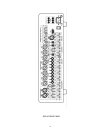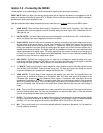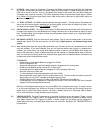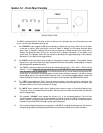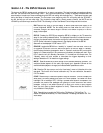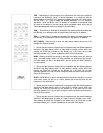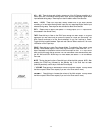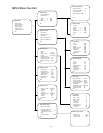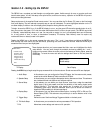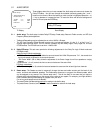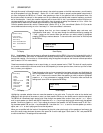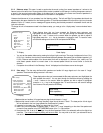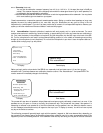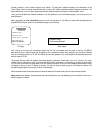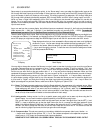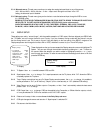
16
Main menu
Audio setup
Main Menu
>Audio setup
Speaker setup
Source setup
Display setup
Trigger setup
THX Audio setup
Exit
Section 5.0 - Setting Up the SSP-60
The SSP-60 has a complete and well-thought-out configuration system, flexible enough for even a complex audio and
home theater system. You will find setup to be quite intuitive, and that once set up, operation of the SSP-60 will prove to
be simple and straightforward.
Setup requires use of the supplied Classé remote control. You may use either the On-Screen (TV) menu or the illuminated
front panel display. The two methods are equally easy to use and understand. The same highlighted selection on the TV
on-screen display is visible on the unit’s display panel (except the Analog Monitor sub-menu).
To begin: be sure the SSP-60 is on. If the SSP-60 display is not on, and the green LED above the standby button is not lit,
then you must turn the power “ON” with the rocker switch above the AC cord on the rear panel. (The SSP-60 may be left
in “Standby” mode indefinitely when not in use. You may wish to unplug it or turn it off completely when you will be away
for a long period of time, or when a thunderstorm threatens). The backup Flash Memory does not require any
maintenance since no battery is used in this system.
Pressing the MENU key on the remote accesses the main menu. The /\ and \/ keys (above and below the ENTER
key)
scroll through the main menus and the sub-menus, positioning the cursor beside the choices. Press the ENTER
key to
access the menu item you have highlighted.
These displays show that you have accessed the Main menu and highlighted the Audio
setup feature. You can scroll through the available choices by pressing the \/ and /\
buttons on the remote. When the cursor points to the feature you wish to adjust, press the
ENTER
key. To leave the menu and save the settings scroll down to Exit and press the
ENTER key.
TV Display Panel Display
Pressing the MENU key to begin setup brings up screens similar to the ones above. Six sub menus and Exit are displayed:
1. Audio Setup In this submenu you can configure the Dolby/DTS setup, the five custom audio presets,
as well as the overall Bass and Treble controls and LFE level.
2. Speaker Setup In this submenu you can configure the speaker levels, distances and sizes. This submenu
also includes the level and distance auto-calibrate options.
3. Source Setup In this submenu you can define your input Sources, name them, assign the associated
digital inputs (if any) and presets, and also the sensitivity of the analog inputs (under
“Analog Monitor”). This sub-menu also permits you to enable any of the three
Component video inputs, select the balanced audio input as source and enable or
bypass the DSP processing for this balanced signal.
4. Display Setup In this submenu you can select various Video options, including NTSC or PAL and On-
Screen-Display (OSD). This sub-menu also permits you to set the distance units in feet
or meters.
5. Trigger Setup Defines the use of the three Voltage Triggers available on the back panel.
6. THX Audio Setup In this submenu you can select the various parameters of THX operation.
7. Exit Memorizes current settings and returns to full operation.



